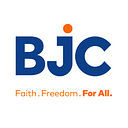Standing on Principles of Faith
By Madison McClendon

As a queer person, I felt deep pain while reading this past week’s Supreme Court ruling regarding the ability of queer people to be considered as foster parents by certain agencies. Regardless of their intention, their actions leave me feeling dehumanized.
It might seem hard to see how I can support religious liberty after this case. The arguments from the plaintiffs against the city of Philadelphia, that their religious freedom required them to judge as unworthy any parents that might look or think or love the way I do, was painful. They want to be able to take money that I and my queer friends pay in taxes and then tell us we aren’t worthy of their time, attention or respect. It felt cruel, and it did a fundamentally destructive act of violence to public Christian witness.
It was even more painful to see the ruling give credence to this hurtful argument. The high court acts as if referring us to someone else is an effective consolation for someone who was just reminded how much we are despised by people who claim to love the God they can’t see but who won’t serve the neighbors they can see.
How could I defend religious freedom after it was invoked with such shameless cruelty?
Quite easily: because religious liberty makes it possible for me to be a queer Christian. I believe in a religious freedom that is bigger than the right to hate. My religious freedom is the right to love, and the right to stand before not only God as individual, but before my fellow humans as a human.
This freedom extends to others: my religious freedom says that I have a right to be Jewish, Catholic, Muslim or atheist and seek to foster a child, without an agency — like Miracle Hill Ministries in my hometown of Greenville, South Carolina — telling me that my faith commitments disqualify me from the right to raise children.
My religious freedom says that my faith — or my choice not to have a faith — isn’t a reason to exclude me from the public square.
And it goes beyond that: my religious freedom is the freedom to know that my God is proud of me. No pastor, priest or Pope can take that from me. On the day I stand before God in judgment, it will be with God that I speak and with Christ as my advocate, and not with Chief Justice John Roberts or Justice Sonia Sotomayor. I will continue to live — proud and alive and in love — with the expectation that I may one day hear the words: “Well done, good and faithful servant.”
In short, my religious freedom is bigger than that held up by the Supreme Court in the Fulton decision. The Supreme Court may not believe that my full citizenship is a compelling public interest, but this is the good news about religious liberty: I worship a God who dissents from harmful and destructive rulings. I will continue to stand on the principles of my faith: that all people matter, that all ways of loving are blessed by God, and that religious liberty is not a weapon against those who are different from me — it’s a gift of life that permits us to live together.
My religious freedom is the right for me to walk into a church and say to my pastor, my lay leadership, my friends, and my family that I am the beloved son of the living God, the worthy daughter of the Most High. Religious liberty is the right to walk into a social service agency funded with the tax money I pay alongside my fellow citizens and be served equally — whether I am a Jew or a Christian, an atheist or a Muslim, a trans man or a non-binary person.
And religious liberty is my right to say that I am proud to be what I am: a gay man, who loves his partner and loves his God.
I’d say the same to the Supreme Court.
Madison McClendon is a member of BJC’s board, representing the Religious Liberty Council.
